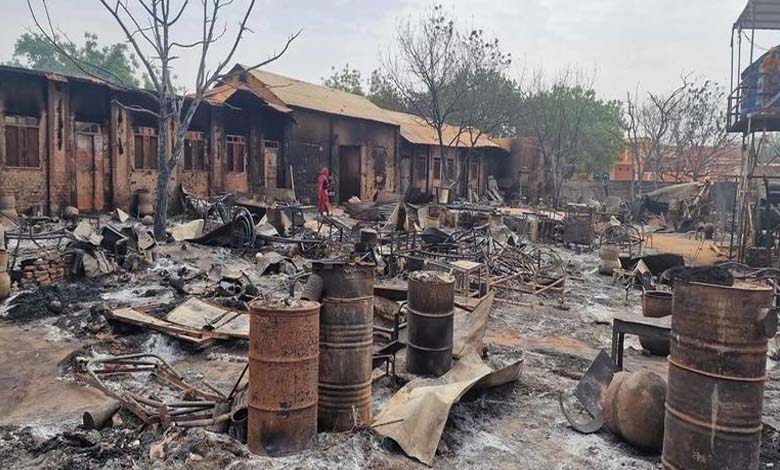Sudan on the Brink of Total Collapse: War Consequences and Policy Failures

Since the outbreak of war in Sudan in April 2023, the beleaguered Arab nation is inching closer to a complete collapse, threatening all facets of life. International reports confirm that the country is experiencing the world’s worst humanitarian crisis. Armed conflicts have become a daily nightmare for over 48 million people. With no political solutions in sight and worsening economic conditions, Sudan’s future appears to promise only greater suffering amid a puzzling international silence.
-
Sudanese Children Pay the Price for the Brotherhood’s War
-
Sudan Crisis: What are the Motivations behind the Ministerial Changes and Their Expected Outcomes?
A Relentless and Absurd War
UN reports paint a grim picture of Sudan’s humanitarian situation. The war has displaced over 11 million people internally, while more than 3 million Sudanese have sought refuge in neighboring countries, making the Sudanese crisis the “largest displacement crisis worldwide,” according to the UN.
Children are the most affected group: 17 million have lost access to education, while over 3.7 million face the specter of malnutrition.
In displacement camps, life is nearly non-existent due to a lack of basic services. Most camps lack clean drinking water and proper sanitation, leading to outbreaks of diseases such as cholera and malaria.
-
Catastrophic Consequences… Millions of Sudanese Children Pay the Price of War. What’s the Story?
-
Ongoing Suffering: More than 25 million Sudanese Face the Specter of Famine
Amid this catastrophe, the Norwegian Refugee Council recounts harrowing stories of violence: entire villages destroyed, civilians executed on the spot, and women subjected to sexual violence in a war observers describe as “relentless and absurd.”
Economy on Life Support
The war’s impact extends beyond humanitarian concerns to an unprecedented collapse of Sudan’s economy.
The Gross Domestic Product (GDP) has plunged by over 70%, and the national currency has depreciated by 400% since the war began. The dollar now trades at approximately 2300 Sudanese pounds, compared to just 600 pounds before the crisis.
-
From Infrastructure Destruction to Arms Smuggling: Analyzing the Sudanese Army’s Manipulation of Facts
-
UN Reports Reflect Shock at the Scale of Sudan’s Worsening Humanitarian Crisis
Estimates suggest Sudan loses around $500 million monthly due to widespread destruction of infrastructure and production facilities. Basic goods prices have quadrupled, and over 80% of the population now lives below the poverty line, with no governmental programs in place to provide support or halt the economic decline.
Widespread Insecurity
The security situation is equally dire. Chaos reigns across much of the country. Over 100 armed groups vie for control of strategic areas. Intense aerial bombardments and the proliferation of armed militias have claimed over 61,000 lives in Khartoum alone, according to a report by the London School of Hygiene & Tropical Medicine.
-
The Brotherhood Plans to Drag Sudan into Civil War… Details
-
Sudanese Army’s Statement on Shambat Bridge Destruction: A Desperate Attempt to Polish a Tarnished Image
In October 2024 alone, approximately 2600 people were killed, and more than 27,000 were displaced. According to UN reports, over 70% of the country has become a battlefield, with villages destroyed, civilians displaced, and organized crime rampant.
Scorched Earth Policy
International and local actors hold both sides of the conflict responsible for prolonging the war. However, the Sudanese army has faced sharp criticism for its “scorched earth” policy, characterized by indiscriminate bombings and large-scale military operations that disregard civilian safety.
-
Demands for the Dissolution of the Sudanese Army and Pursuit of the Muslim Brotherhood
-
Expert Comments on “Gas Emissions” from the Earth in Northern Sudan
While the army claims to fight for restoring security and stability, observers argue the conflict has devolved into a struggle for political scores among rival factions, with no genuine vision to end the crisis or ease Sudanese suffering.
Calls to Salvage What Can Be Saved
At the end of his visit to Sudan, Norwegian Refugee Council Secretary-General Jan Egeland issued a stark warning: “Sudan is on an unrelenting countdown to total collapse.” He added, “The world remains silent in the face of Sudan’s tragedy, despite the catastrophe’s scale necessitating urgent international mobilization.”
-
This is how Sudan’s Muslim Brotherhood is trying to impose its control over the media and encircle journalists.
-
Strengthening Humanitarian Access and Respect for Law: International Pressures to Resolve Sudan’s Crisis
International experts urge intensified diplomatic efforts to establish a ceasefire allowing humanitarian aid and initiating a comprehensive political process. However, analysts caution that without addressing the root causes, these efforts will amount to “temporary relief” for a systemic crisis consuming the nation.












